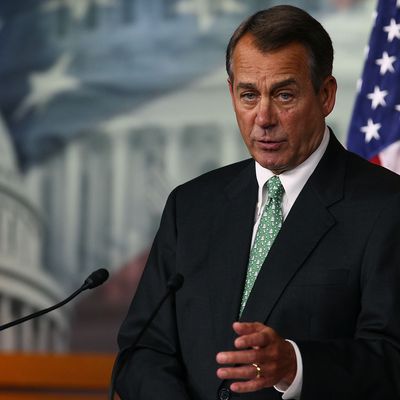
House Republicans are revolting against an agreement to extend payroll tax cuts, and Democrats are complaining that they can’t be controlled or counted on to stick to a deal. The more interesting question is: Why are Republicans recoiling from a deal to cut taxes?
Various commentators have expressed shock that Republicans are giving President Obama a hard time over a tax cut. Matthew Yglesias attributes this stance to hardball negotiating, Greg Sargent to partisanship. I think it’s that conservatives don’t like progressive tax cuts, and the payroll tax cut is relatively progressive. (It’s a temporary measure designed to boost consumer demand during the recession, and lower-income consumers spend a higher proportion of their income, though the payroll tax cut goes to everybody.) This is a sign of an important shift in Republican thinking on taxes.
The Republican anti-tax position has always been primarily aimed at reducing taxes paid by wealthy Americans. Since Americans tend to oppose tax cuts for the rich, Republicans always tied together middle-class tax cuts with the upper-bracket cuts they really wanted. The traditional Republican tax cut over the last 30 years has combined a small tax cut for the middle class with a huge tax cut for the rich — increasing the proportion of federal taxes paid by the middle-class, but reducing the level. They sold this position to the public by expressing it as a generalized, across-the-board opposition to taxes, everywhere and always.
Over the last two years, conservatives have grown increasingly alarmed by the low federal tax burden faced by the bottom half of the income distribution. The putative worry is that these bottom 47 percenters pay no income taxes, but Republicans seem upset that they pay too little in payroll taxes as well. In fact, most American workers who don’t have an income tax liability do have a payroll tax liability, and the distinction between which revenue streams fund what government programs is not terribly important.
In any case, the bottom line is that Republicans have grown increasingly concerned about the low tax burden on the middle and lower tiers of the income spectrum. The middle-class tax cuts were the price of admission in order to get the good stuff for the rich folks. It’s become a price of admission fewer Republicans are willing to pay.
This is what was driving the Republican negotiating position in the supercommittee. In return for spending cuts, Republicans offered a very small increase in revenue, which was largely designed to head off expiration of the Bush tax cuts. But the most important caveat is that the Republican offer required locking in lower tax rates for the rich. Ipso facto, the higher revenue they would accept would have to come in the form of higher taxes on the middle class.
Republican opposition to extending the payroll tax is, in part, an expression of this same belief that the lower-earning half of the income distribution is getting a free ride – that the “takers” are exploiting the “makers,” to use Paul Ryan’s increasingly common catchphrase. This happens to be a wildly unpopular position, and Republicans are attempting to avoid having to defend it openly. (Being unpopular obviously isn’t the same as being wrong, though I do disagree with the Republican position.)
That’s why they are couching their opposition to extending the payroll tax in other, unrelated arguments. They are insisting that any extension be paid for, even though they made no such demand when it came to extending the Bush tax cuts. Now they are trying to tie the payroll tax together with the politically fraught issue of the Keystone pipeline. If you want something to pass, you keep it separate from other controversial voting issues. If you want to keep something from passing but you don’t want to openly oppose it, you maneuver to tie it together with other controversial issues that could sink it.
The maneuvering over this in Congress reflects the desire by Republicans to stop the extension of the payroll tax cut without openly making that case. They will very likely capitulate in the end because party leaders recognize that “no tax cuts for people who aren’t job creators” is not a winning message. In the meantime, Republicans are clearly showing their anger, not just at the tax burdens placed upon the rich, but at the alleged lack of such a burden on everybody else.






























